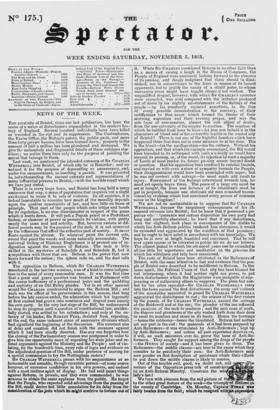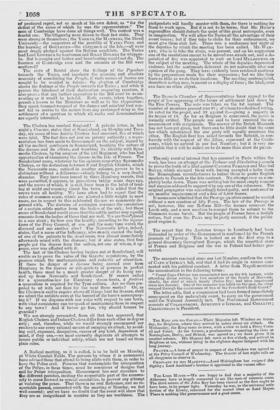NEWS OF THE WEEK.
THE great city of Bristol, since our last publication, has been the scene of a series of disturbances unparalleled in the modern his- tory of England. Several hundred individuals have been killed or wounded in the riot and its suppression. The Customhouse, the Excise Office, the Bishop's palace, the public gaols, and more than forty private houses, have been burned down ; property to the amount of half a million has been plundered and destroyed. We give the melancholy and disgraceful details of these outrages else-. where ; we notice them here only for the purpose of pointing the moral that belongs to them. Last week, we mentioned the intended entrance of Sir CHARLES WETHERELL into Bristol, of which city he is Recorder; and we noticed it for the purpose of deprecating so unnecessary, and, under the circumstances, so insulting a parade. It was persisted in, notwithstanding the earnest entreaty and representations of many influential persons in Bristol,—with the terrible result which we have just stated. There is in every large town, and Bristol has long held a sorry eminence that way, a mass of population that requires but a slight excitement to rouse it to acts of violence. In all societies, it is indeed lamentable to consider how much of the morality depends upon the positive constraints of law, and how little on those of principle. That part of the people which asks whips and bonds for its regulation, is no nice discriminator in respect of the game which it hunts down. It will pelt a Popish priest or a Protestant bishop, or clamour at power or persecute its victims, with pretty nearly the same zeal and activity. But, however various at dif- ferent periods may be the passions of the mob, it is not unmoved by the influences that affect the reflective part of society. It never floats against the stream. To whatever point the current sets, round that point the weeds and scum naturally accumulate. The universal feeling of thinking Englishmen is at present one of in- dignation against the enemies of Reform. The mob is little skilled in the mysteries of Schedule A and Schedule B, but it sympathizes with those that are. Reform is the power that now bears forward the nation ; the sphere rolls on, and the dust rolls with it.
The opposition to Reform, which Sir CHARLES WETHERELL manifested in the last two sessions, was of a kind to rouse indigna- tion in the mind of every reasonable man. It was the first time that a great and grave question was treated in Parliament with the coarse buffoonery of a professional jester and the quibbling and sophistry of an Old Bailey pleader. Yet in no other manner would Sir CHARLES condescend to argue the Reform Bill ; and such was the effect of his perseverance in this course, that long before the late session ended, the admiration which his ingenuity at first excited had grown into weariness and disgust even among his own party. In the very last stage of the Bill, he endeavoured to stop its progress until a question of constitutional law, acciden- tally started, was settled to his satisfaction ; and only at the en- treaty of his leader, Sir ROBERT PEEL, desisted from repeating, at the end, the same indecent scene of successive divisions which had signalized the beginning of the discussion. His constant aim at delay and vexation did not finish with the measure against which it had been chiefly directed. Has any one forgotten how the closing of the Parliamentary session was postponed in order to give him one opportunity more of repeating his stale jokes and re- futed arguments against the Ministry and the People ; and of vio- lating, for the hundredth time, every rule of logic and evidence on the adjudicated question of the. Bill, under pretence of moving for a special commission to try the Nottingham rioters ? Sir CHARLES WETHERELL passes with his acquaintance as an honourable and amiable, though eccentric person—of some coarse humour, of excessive confidence in his own powers, and endued with a most restless, spirit, of display. He had said smart things against Reform, in private, and they were commended ; he was anxious to obtain the same applause from the public. He forgot that the people, who expected solid advantage from the passing of the Bill, could, deriye but little consolation for its delay from the consideration of the jests which he might contrive to torture out of it. While Sir CHARLES considered Reform in no other light than as a means of raising a laugh in the House of Commons, the People of England were anxiously looking forward to the chances of its passing, and deeply indignant that these should he dimi- nished, not in subservience to the fears or reason of its honest opponents, but to gratify the vanity of a ribald jester, to whom increasing years might have taught silence if not wisdom. The unqualified disgust, however, with which Sir CHARLES'S speeches were regarded, was cold compared with the irritation produced out of doors by his nightly misstatements of the feelings of the people — by his constantly repeated assertions, in the face of every possible demonstration to the contrary, of their indifference to that cause which formed the theme of their morning aspiration and their evening prayer, and was the sole topic of conversation, almost the sole object of desire, from the one extremity of the empire to another. The reaction of which he babbled from hour to hour—let him now behold it in the characters of blood and of fire so terribly legible in the wasted city of Bristol I There is not one of the frightful disasters which have happened there that does not in some measure lie at his door. His is the blood—his the conflagration—his the robbery. Without his opposition, and that which his example encouraged, the Bill would have travelled to its settlement with such a celerity as would have insured its passing, or, at the worst, its rejection by such a majority of Lords as must render its future passing secure beyond doubt or question. Had his opposition been confined to rational bounds, and carried on with even a show of sympathy towards the People, their disappointment would have been unmingled with anger; but he was not content with outrage—he must needs add insult to injury. Forewarned of the feelings entertained towards him, he must yet openly brave them. The peace of a large city must be set at nought, the lives and fortunes of its inhabitants must be put in jeopardys because one obstinate old man remained uncon- vinced by evidence which had convinced every person of common sense in the kingdom! We are not so uncharitable as to suppose that Sir CHARLES WETHERELL foresaw the sanguinary consequences of his ill- omened entrance into Bristol ; but he knew that it possessed a po- pulace who .s.! ignorance and riotous disposition his own party had long and carefully cherished ; he knew that if any disturbance, even the slightest, took place in consequence of the dislike to which his Anti-Reform politics rendered him obnoxious, it would be extended and aggravated by the condition of that populace ; and he ought to have acted in accordance with his knowledge. We hope he is now at length humbled and convinced. That he will ever again appear or be tolerated in public life we do not believe. The utmost period to which his advanced years can be extended is all too little for repentance and meditation on the grievous ills which his wilfulness and folly have occasioned.
The riots of Bristol have been -attributed to the Reformers of Bristol, with the same attention to fact and evidence that the peo- ple of Bristol were described to be indifferent to Reform. In the same spirit, the Political Union of that city has been blamed for not interposing, where it had neither right nor power, to put down disturbances which the Magistrates were incapable of sup- pressing or of authorizing others to suppress. The plain fact can- not be too often repeated—Sir CHARLES WETHERELL S entry into the town caused the first disturbance; the array and violence of the constables appointed to guard Sir CHARLES 'WETHERELL. aggravated the disturbance to riot ; the seizure of the first rioters by the guards of Sir CHARLES WETHERELL caused the outrage at the Bridewell and at the inn; the plunder of the inn inflamed the passions of the mob to madness ; and the mob once at work, the thieves and plunderers of the city rushed forth from their dens to swell its numbers and share in its booty. Hence the burnings —hence the robberies—hence the bloodshed. Reform had neither art nor part in the riot: the materials of it had been prepared by Anti-Reformers—it was stimulated by Anti-Reformers ; kept up by Anti-Reformers ; and unless all past experience deceives us, it will, as such ministers ever do, prove the bane of Anti-Re- formers. They sought for support among the dregs of.the people —the HUNTS of society—and it has been given to them. The Reformers—the middle classes—are true to the cause which they consider to be peculiarly. their own : the Anti-Reformers may now ponder on that description of assistance which their efforts to put down the middle classes is likely to receive. Out of this terrible evil, good, we doubt not, will writers of the Opposition press talk of constraini by an Anti-Reform Ministry. Constrain the whi lady's fan !
We turn with pleasure from the sad picture of t to the other great feature of the week—the triumPltUf. i ,4 the county of Cambridge. On Monday, Captainr.Xtmail Wan fairly beaten from the field; which he resigned withiintOpresSion. of profound regret, not so much at his own defeat, as " for the defeat of the cause of which he was the representative." The men of Cambridge have done all things well. The contest was a fearful one. The Oligarchy were driven to their last stake. They were strong in themselves ; the YORKES, the MANNERS, the liberal University—the supporters of the gentility of YATES PEEL and the learning of GOULBURN—the clergymen of the Isle,—all were most deeply pledged against the Reform candidate. The Tories had Lord LOWTHER for huntsman and BILLY HOLNIES for whipper- in. But boroughs and bribes and browbeating would not do. The freemen of Cambridge rose and the enemies of the Bill were scattered !
The riots of Bristol show the feelings of the Populace towards the Tories, and inculcate the pressing and absolute necessity of conciliating the People, if such scenes of horror are sought to be avoided in future : the election of Cambridge shows the feelings of the People towards the Tories ; and while it proves the falsehood of their declaration respecting reaction, it also proves that any further opposition to the Bill must be as un- availing as it would be hateful. Both events, taken together, preach a lesson to the Ministers as well as to the Opposition : they speak trumpet-tongued of the danger and mischief that can- not fail to accrue to the nation from any prolonged delay in the settlement of a question in which all ranks and denominations are equally interested.



























